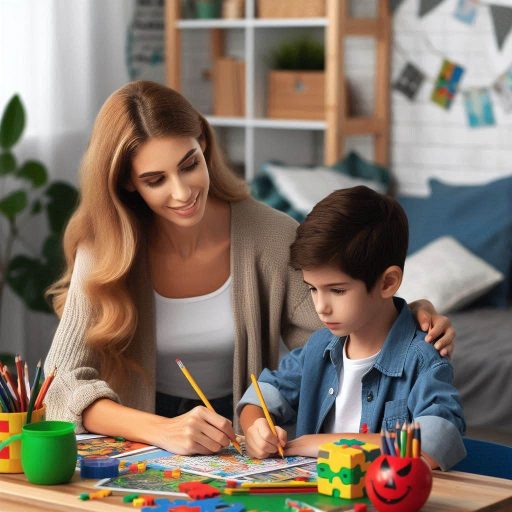Introduction
Educational therapy is a specialized intervention that helps students with learning challenges improve their academic skills.
It typically involves one-on-one sessions with a trained professional.
Parent testimonials play a crucial role in understanding the effectiveness of educational therapy.
They provide firsthand accounts of the impact of therapy on their children’s academic and personal development.
Parent Testimonial: Sarah’s Experience
Sarah’s son, Jack, struggled with reading comprehension and writing skills.
After a few months of educational therapy, Sarah noticed a significant improvement in his academic performance.
She credits the personalized approach of the therapist for Jack’s progress.
The therapist tailored activities to Jack’s learning style, making sessions engaging and effective.
Furthermore, Sarah appreciated the open communication between the therapist and herself.
Regular updates on Jack’s progress helped her understand his strengths and areas for improvement.
As a result of educational therapy, Sarah saw Jack’s confidence soar.
He no longer felt overwhelmed by schoolwork and started to enjoy learning new concepts.
Parent Testimonial: Mike’s Story
Mike’s daughter, Emily, had difficulties with math concepts and organization skills.
With the help of educational therapy, Emily began to grasp mathematical concepts more easily.
The therapist used hands-on activities and visual aids to help Emily understand complex math problems.
Mike noticed a significant improvement in Emily’s confidence and problem-solving abilities.
Moreover, the therapist worked collaboratively with Mike to implement strategies at home that supported Emily’s learning.
This partnership proved invaluable in Emily’s progress.
Educational therapy not only improved Emily’s academic performance but also boosted her self-esteem.
Mike was grateful for the positive impact it had on his daughter’s overall well-being.
Transform Your Career Today
Unlock a personalized career strategy that drives real results. Get tailored advice and a roadmap designed just for you.
Start NowOverview of educational therapy
Educational therapy is a specialized form of therapy that focuses on helping individuals with learning difficulties or disabilities overcome academic challenges.
Definition of educational therapy
Educational therapy involves one-on-one sessions with a trained therapist who uses specific strategies to address and improve a student’s learning abilities.
It aims to enhance cognitive, emotional, and behavioral skills to help students achieve academic success.
Therapists work closely with students to identify underlying issues that may be hindering their learning progress.
Common techniques used in educational therapy
Individualized lesson plans tailored to the student’s needs and learning style.
Multi-sensory activities that engage different senses to enhance learning retention.
Cognitive exercises to improve memory, attention, and problem-solving skills.
Behavioral interventions to address any issues that may be impacting the student’s academic performance.
Targeted audience for educational therapy
Students with learning disabilities such as dyslexia, ADHD, or autism spectrum disorders.
Individuals struggling with executive functioning skills, attention deficits, or processing disorders.
Students who have experienced trauma or emotional challenges that are impacting their ability to learn.
Now, let’s delve into the personal experiences of parents whose children have undergone educational therapy.
Read: How to Measure Progress in Educational Therapy
Importance of Parent Testimonials
Parent testimonials play a crucial role in providing valuable insights and first-hand experiences about the effectiveness of educational therapy for children.
These testimonials offer a glimpse into the real-life impact of therapy and help parents understand its benefits and challenges.
How parent testimonials provide insight into the real-life impact of educational therapy
Parents share their personal stories and experiences, showcasing the progress and improvements they have witnessed in their child after undergoing educational therapy.
They highlight the positive changes in their child’s behavior, academic performance, and overall well-being that have resulted from therapy sessions.
By sharing their journey, parents offer a perspective that is relatable and relatable, allowing other parents to understand the potential outcomes of therapy.
Parent testimonials provide a human touch to the information about educational therapy, making it more accessible and understandable for parents seeking guidance.
Showcase Your Business Today
Reach thousands of readers actively exploring professional services. Publish your business profile and grow your audience now.
Publish NowThrough real-life examples and anecdotes, parents demonstrate the transformative power of therapy in enhancing their child’s learning abilities and confidence.
Ways in which parent testimonials can help other parents make informed decisions about educational therapy for their child
Parents can gain valuable insights and tips from the experiences shared by others, helping them make informed decisions about whether educational therapy is suitable for their child.
Reading testimonials can provide reassurance and encouragement to parents who might be hesitant or unsure about starting therapy for their child.
Parents can learn about the different types of therapy available, the process involved, and the expected outcomes by reading about the firsthand experiences of others.
Testimonials can help parents understand the commitment and dedication required for therapy sessions, as well as the importance of consistency and follow-through.
By reading about the successes and challenges faced by other families, parents can mentally prepare themselves for the journey ahead and set realistic expectations.
Overall, parent testimonials offer a wealth of information and support to parents considering educational therapy for their child.
These testimonials serve as a valuable resource for decision-making and empower parents to make informed choices that are best suited for their child’s unique needs.
Read: Case Management in Educational Therapy: Best Practices

Sharing personal experiences
Parents often find themselves seeking out educational therapy for their children when traditional methods have not proven effective.
This decision can be a challenging one, filled with uncertainty and hope for improvement.
Below are collected parent testimonials sharing their experiences with educational therapy.
Each story is unique, highlighting both success stories and challenges faced during the therapy process.
Parent Testimonial #1
“When we first started educational therapy for our son, we were skeptical about how much it could help.
However, after just a few sessions, we began to see a noticeable improvement in his reading skills.
The therapist was patient and understanding, tailoring the sessions to meet his individual needs.
It was a relief to see our son gain confidence in his abilities and make progress academically.”
Parent Testimonial #2
“Our daughter struggled with attention and focus in school, making it difficult for her to keep up with her classmates.
The educational therapist worked with her to develop strategies for staying on task and improving her organizational skills.
Over time, we saw a significant change in her ability to concentrate and complete assignments.
The therapist’s guidance and support were instrumental in helping our daughter succeed academically.”
Parent Testimonial #3
“One of the main challenges we faced during our son’s therapy was the time commitment required.
Balancing therapy sessions with school work and extracurricular activities was a juggling act, but we knew the benefits of therapy outweighed the sacrifices.
It was a challenging journey, but seeing our son’s progress made it all worth it.”
Lessons Learned
Through these parent testimonials, we can see the power of educational therapy in transforming the lives of children struggling with academic challenges.
The success stories shared by parents highlight the positive impact that tailored intervention can have on a child’s learning abilities.
However, it is important to acknowledge the challenges faced during the therapy process, such as time commitments and adjustments to daily routines.
Despite these obstacles, the reward of seeing a child gain confidence and thrive in their academic pursuits is invaluable.
Read: Educational Therapy for Emotional and Behavioral Issues
Testimonials on the effectiveness of educational therapy
Parents who have experienced educational therapy for their children have shared numerous positive outcomes that have been beneficial for both the child and the family as a whole.
These testimonials highlight the impact that educational therapy can have on academic performance and behavior.
Positive outcomes experienced by parents and their children
Parents have seen a remarkable improvement in their child’s confidence levels after undergoing educational therapy.
Children who struggled with learning disabilities have shown significant progress and are now excelling in their academics.
Family dynamics have improved as parents feel more supported in managing their child’s educational needs.
Children have gained a sense of accomplishment and pride in their achievements, boosting their self-esteem.
Improvement in academic performance and behavior after undergoing educational therapy
Parents have noticed a positive shift in their child’s attitude towards learning, with increased motivation and eagerness to participate in educational activities.
Children who previously struggled with focus and attention span have shown improvements in their ability to concentrate on tasks.
Academic grades have improved significantly, with children achieving better results in school subjects that were once challenging for them.
Behavioral issues such as impulsivity and defiance have decreased, leading to a more harmonious home environment.
Overall, the testimonials from parents who have experienced educational therapy for their children demonstrate the significant impact it can have on improving academic performance, behavior, and overall well-being.
Showcase Your Business Today
Reach thousands of readers actively exploring professional services. Publish your business profile and grow your audience now.
Publish NowThe positive outcomes shared by these parents serve as a testament to the effectiveness of educational therapy in supporting children with learning challenges.
Read: Collaborating with Teachers and Educational Therapists
Testimonials on the challenges faced during educational therapy
As a parent, I faced difficulties in getting my child to focus during therapy sessions.
The therapist provided personalized strategies to help my child stay engaged.
It was challenging to see slow progress initially, which tested my patience as a parent.
The therapist assured me that progress takes time and to trust the process.
Difficulties encountered during the therapy sessions
One of the main challenges was my child’s lack of interest in the activities.
My child exhibited behavior issues that sometimes disrupted the sessions.
It was hard for my child to stay on task and follow instructions consistently.
My child struggled with certain concepts and found it frustrating to keep up.
Strategies used to overcome obstacles and continue with therapy
The therapist introduced different learning techniques tailored to my child’s needs.
I implemented a reward system at home to encourage my child to participate actively.
We established a routine that included breaks to prevent burnout during sessions.
Open communication with the therapist helped address concerns promptly and make necessary adjustments.
Recommendations and advice from parents
Parents who have experienced educational therapy with their child can offer valuable insight to others considering this approach.
Here are some tips and suggestions based on their experiences:
Tips for other parents considering educational therapy for their child
- Research and find a qualified educational therapist who specializes in your child’s specific needs.
- Be actively involved in the therapy process and communicate openly with the therapist about your child’s progress.
- Set realistic goals and expectations for the therapy and be patient with the progress.
- Incorporate therapy techniques and strategies into your daily routine at home to reinforce learning.
- Stay consistent with therapy sessions and follow through with recommended exercises or activities.
Suggestions for improving the educational therapy experience based on personal experiences
- Provide regular feedback to the therapist about what is working well and what can be adjusted.
- Request periodic progress reports and updates on your child’s development in therapy.
- Explore additional resources or support groups for parents of children undergoing educational therapy.
- Consider involving other professionals, such as teachers or psychologists, in your child’s therapy to provide a well-rounded approach.
- Celebrate small milestones and achievements in therapy to encourage your child’s progress and motivation.
Overall, parents emphasize the importance of being proactive, supportive, and patient throughout the educational therapy journey.
Each child is unique, and finding the right balance of support and guidance is essential for success.
Conclusion
Parent testimonials provide invaluable insights into the benefits of educational therapy.
Their firsthand experiences reveal how personalized support transforms their children’s learning journeys.
These stories highlight the impact of tailored strategies, building trust and understanding within the educational community.
Hearing from other parents reassures those considering educational therapy.
It offers a real-world perspective, showing how it addresses unique learning needs effectively.
These testimonials often resonate more deeply than any clinical explanation, making them powerful tools for advocacy.
Sharing testimonials fosters a supportive network.
Parents who share their experiences can help others navigate similar challenges.
Their stories create a sense of community, offering hope and guidance to those just beginning their journey.
By sharing your story, you contribute to a collective understanding of educational therapy.
Your experience might be the key that encourages another parent to seek help for their child.
It also helps professionals refine their approaches, ensuring they meet the needs of diverse learners.
Encourage others to share their testimonials, creating a ripple effect of support and awareness.
Every story matters in the broader conversation about educational therapy.
Together, these testimonials can drive change, making educational therapy more accessible and understood.
Your voice is powerful. Use it to help others find the right support for their children’s educational needs.
[E-Books for Sale]
The Big Book of 500 High-Paying Jobs in America: Unlock Your Earning Potential
$19.99 • 500 High-Paying Jobs • 330 pages
Explore 500 high-paying jobs in America and learn how to boost your career, earn more, and achieve success!
See All 500 High-Paying Jobs of this E-Book
1001 Professions Without a Degree: High-Paying American Jobs You Can Start Now
$19.99 • 1001 Professions Without a Degree • 174 pages
Discover 1001 high-paying jobs without a degree! Unlock career tips, skills, and success strategies for just $19.99!




